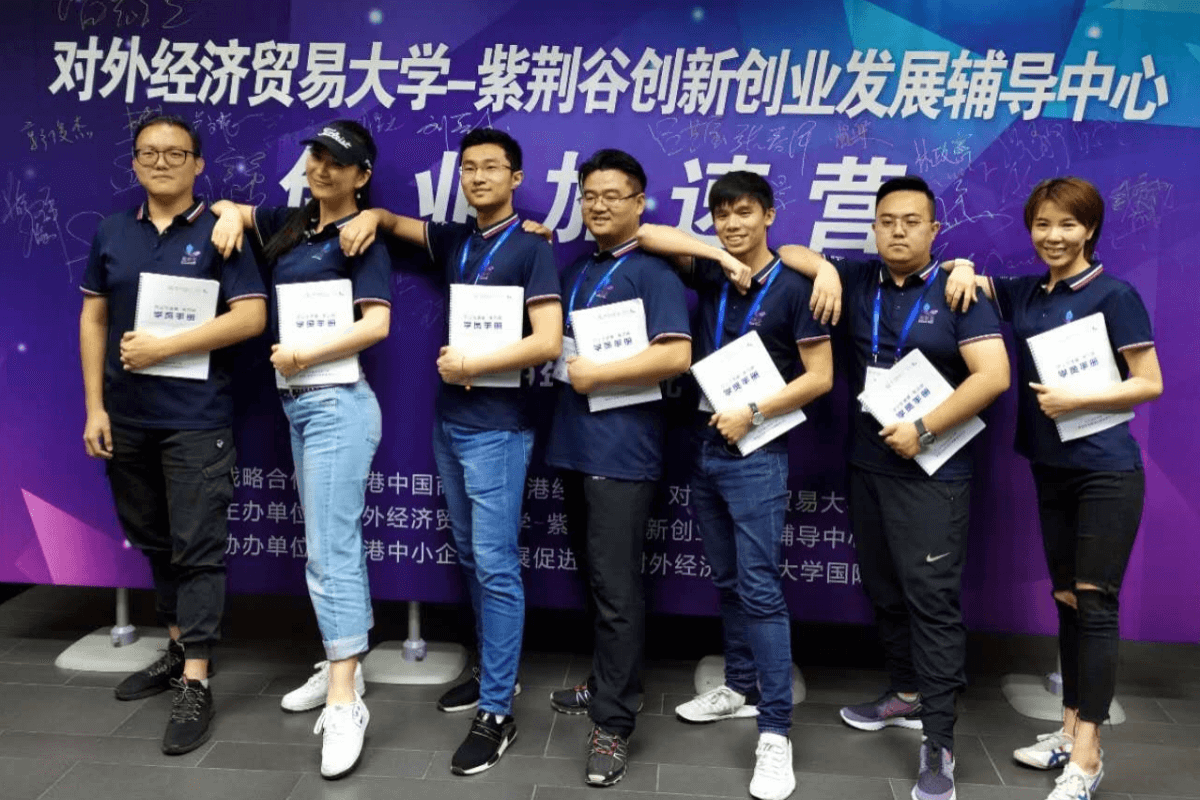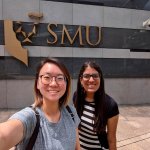[Featured image: Foo Yong Long (third from right) participating in an entrepreneurship bootcamp hosted by Beijing School of International Trade and Economics]
By SMU Institute of Innovation & Entrepreneurship
Intense competition, massive market, and heavily relational—these are commonly known characteristics of how business is conducted in China. With a population of over 1.4 billion, the republic is on track to be the world’s largest economy, and is well-positioned at the leading spot of the race to become a technological innovation hub and powerhouse, if not already so.
Over the summer, three Singapore Management University (SMU) students completed their three-month internships in China. It comes as no surprise that interns wear many hats, especially in startup environments. From running nation-wide events, hosting government officials to developing a new app and translating it for the English-speaking market, SMU students have proved to be adept in bringing value and putting their bilingual skills to good use.

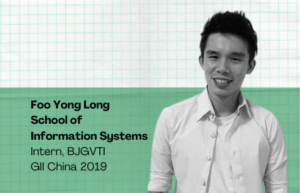
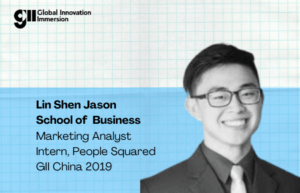
The three students were among the 184 students who have undergone the Global Innovation Immersion (GII) programme by SMU’s Institute of Innovation & Entrepreneurship (IIE), since 2015. Vera Sun interned in Shanghai at neoBay, a startup incubator in Shanghai Jiaotong University, while Foo Yong Long interned at Beijing Global View Technology Incubator, which fosters collaboration between startups in Beijing and Taiwan via events and exchange programmes. Jason Lin interned in Shanghai at People Squared, one of the first co-working space companies to begin operations in China, and the sole partner of the Google for Startups Program in the entire country.
Having been exposed to new markets and environments, GII interns develop a well-rounded set of skills such as cultural dexterity and resourcefulness. The immersion also opened their eyes to wider horizons and local opportunities. And the common thread among Vera, Yong Long and Jason? They unanimously agree that China is on the forefront of tech and innovation.
Here are their observations on how the way of life in China differs from Singapore’s.
Why did you choose China for your GII internship?
Jason: I picked China because I feel that it is a land of opportunities. China is the second largest economy in the world and poised to overtake the USA in the future. China has a major influence on Asia/Southeast Asia, especially with the One Belt One Road project that seeks to connect the region geographically and economically. The sheer mass of their domestic market, serving around 1.4 billion people, presents a huge consumer base. China’s tech ecosystem is very well established, as there is an abundance of resources for potential startups to succeed. This ranges from funding, availability of talent pool, mentorships and more. Overall, I believe the Chinese are more entrepreneurial and the tech ecosystem is very active.
Vera: China is the world’s second largest economy and innovation hub. I wanted to experience how living in an Asian startup powerhouse would be like, and Shanghai is the perfect city to do so. It’s a modern and big city full of startup events.
I have always wanted to pursue entrepreneurship, but I never knew how to get started. GII was the perfect opportunity for me to explore life as a startup employee and therefore I applied for the GII Shanghai Programme.
Yong Long: There were three driving forces behind my motivation for the GII internship: my need for a fast-paced environment, to achieve a global footprint and to embark on a journey of self-discovery. China fulfilled the criteria and seemed like a good place to do so!
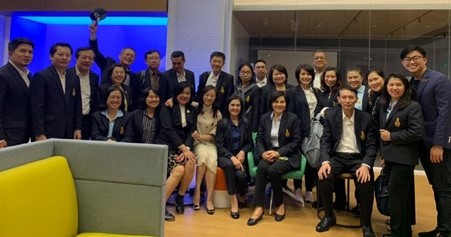
Jason Lin (extreme right) hosting government officials from Thailand who were in Shanghai to understand more about the Chinese tech ecosystem
Through your experience there, what did you learn about China?
Jason: Mobile payment is so prevalent in China, you can pretty much do everything with your phone. To illustrate how convenient things are in Shanghai, I caught chicken pox during my first week of work and had to stay alone in my apartment for two entire weeks. My blisters were itching badly and I couldn’t go out to buy relief medication. Fortunately, I was able to do an e-consultation with a pharmacist who got the calamine lotion delivered to my doorstep.
Vera: Life in China is incredibly fast paced, hi-tech, and convenient. Thanks to the likes of Alipay, WePay and Taobao, shopping for groceries, products and having meals never felt easier. You do not even have to step out of your home to do any of the aforementioned. It opened my eyes to a world beyond Singapore and made me learn so much about the impact of technology and successful startups in our lives.
Yong Long: The tech in China’s ecosystem has a better integration with the day to day lifestyle of the citizens compared to Singapore. For example, when it comes to purchasing items, most businesses accept mobile payments out of convenience and also to avoid counterfeit notes. Even street beggars place QR codes on their signboards to make it easy for contributions to be made.
What is your view of “China Market at the Forefront of Innovation”?
Jason: China was initially lagging in technology when they started their economic reform in 1978. Many developed countries moved their production facilities to China to benefit from the low labour cost and China was quick to replicate the technologies from these companies. Since then, China has grown from being an imitator to an innovator. China’s technology companies such as WeChat and Tencent are testimonies of their innovation.
The pioneer generation of tech entrepreneurs such as Jack Ma and Pony Ma has encouraged many young Chinese to dive into the pursuit of tech innovation. This will create a strong driving force for China’s next generation of innovations. However, it is also important to note that China has a unique regulatory and business environment, so whatever works in China might not work overseas.
Vera: China has really impressed me with how technologically advanced they are, especially on the AI and e-payment frontiers. They are the trendsetters for the e-wallet system especially through WeChat and Alipay. Even Facebook’s founder, Mark Zuckerberg, aspires towards creating an e-wallet system like WeChat. China has proven to be a formidable innovation powerhouse.
Yong Long: I strongly believe that the China market will be at the forefront of innovation. With a massive user base and an increasing middle income, the country’s adoption rate for new technologies is growing rapidly. In turn, the huge amount of information and data generated from these end consumers can help technologies improve faster.
What do you think is attractive about an internship programme like GII?
Jason: I feel that students should take on an internship with IIE regardless of whether they intend to work in Singapore or overseas in the future. The world is increasingly interconnected, and having an understanding of a foreign market will be a great value in any employee. Singapore is a small market with only five million people. As a Singaporean, I feel that it is imperative for us to venture out and not limit ourselves to the home market.
Vera: I would love to recommend GII to my juniors, especially those who have a keen interest in entrepreneurship. The experience overseas will likely be a life-changing one as it immerses you in an environment of innovation where you are surrounded by people who are constantly searching to start something new. I was inspired by the people I met, especially the founders of startups and passionate students who are waiting to start building their businesses.
Yong Long: GII shortlisted students were provided with training sessions ranging from hard skillsets like digital marketing and analytics to soft skills such as personal branding and networking. These workshops were very useful and equipped students with essential knowledge prior to the interviews and internship.
After the GII internship, you will become more resourceful, independent and focused as an individual. This will benefit you in the pursuit of your goals and fostering of personal relationships. Furthermore, this is a great opportunity for you to discover your interests, observe different perspectives and learn from others.
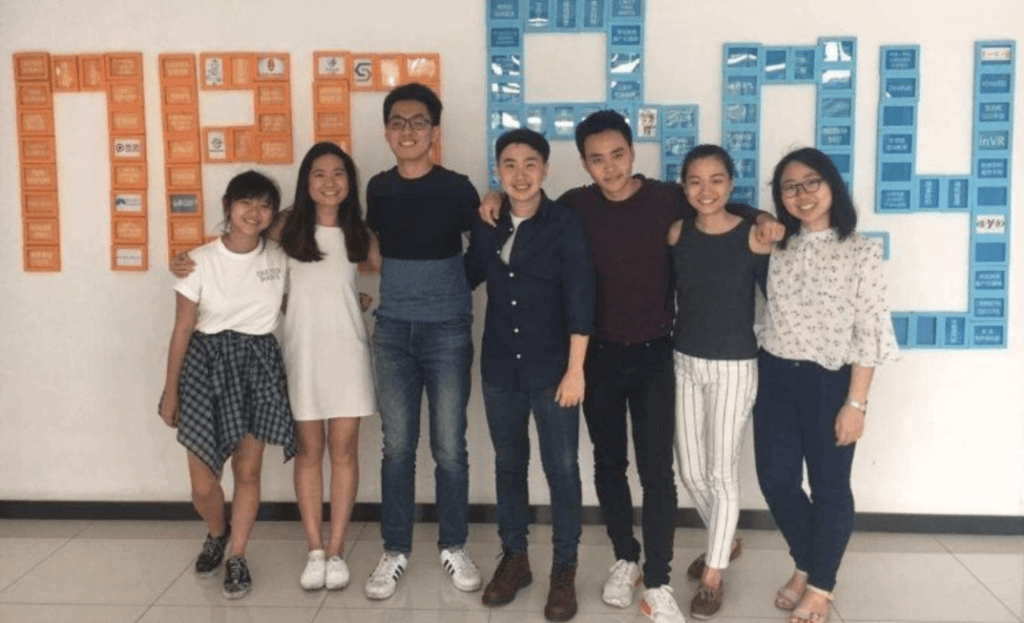
Vera Sun (extreme left) with friends from SMU, at the neoBay office
What is a piece of advice or tip for a student who wants to make the most of GII?
Jason: Be receptive to new ideas, experiences, and people! You will be surprised at what you are going to find!
Vera: Always have an open mind and be ready to immerse yourself into the culture and lifestyle of the new country. You will make the most out of your internship by befriending the locals more and hanging out with your colleagues often.
Yong Long: Be aggressive and do not be afraid to sell your skillsets. In a startup, there is a variety of tasks that differ heavily in terms of skills requirement and scope. Make sure you communicate your value well even after your interview. Three months is a short period so be sure to play to your strengths.
With US and China currently in a “tech cold war” to vie for global tech dominance, the race for power has pushed China to strive for more exponential success and breakthroughs in companies like Huawei and TikTok.
With the vast market and opportunities for growth in China, it is even more important to develop global awareness as it will significantly enhance your value to potential employers. One of the best ways to gain experience is to take on an internship with overseas companies in exciting markets like China and Southeast Asia.
The Global Innovation Immersion (GII) programme is a 3-month virtual / overseas internship with high-growth innovative companies, tailored for SMU students who are passionate about starting businesses, the startup ecosystem, and innovation and digital transformation. This internship is open to all full-time SMU undergraduates who are returning for at least one semester of study. Find out more about the programme here.
Applications are open now for summer 2021! Apply before 23 November 2020. Feel free to email us for queries.

